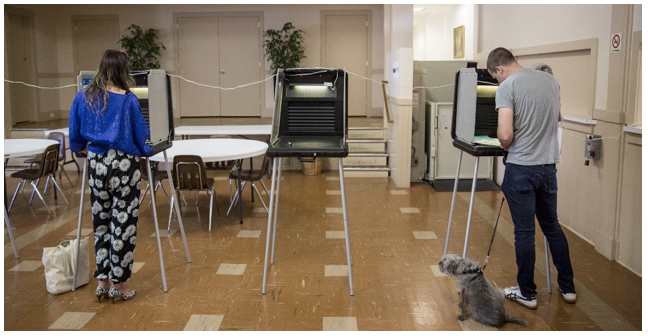CommentsVOTING DISPARITY-The United States is, by and large, not a very politically participatory country. Not only do Americans vote in relatively small numbers, they also don’t contact their representatives, take part in campaigns, or even talk about politics all that much.
It’s also a politically unequal country, with white people participating more than other groups -- a fact highlighted in a new report on political participation in California.
“Since 2000, California has been a majority-minority state where no racial group holds a numerical majority,” write Advancement Project researchers John Dobard and Kim Engie and University of California-Riverside political scientists Karthick Ramakrishnan and Sono Shah. “Yet California’s democracy does not accurately reflect that demographic reality.”
Drawing on the U.S. Census Bureau’s Current Population Survey Voter Supplement, the team estimates that an average of 68 percent of white U.S. citizens in California voted in presidential elections between 2004 and 2012, compared to 65 percent of blacks and 51 percent of Latinos. Meanwhile, just 48 percent of Asian Americans voted.
“Racial disparity has been a common thread in voting and nonvoting forms of political participation. This does not bode well for California’s democracy.”
That same basic pattern held true for mid-term elections, albeit with even smaller numbers overall. Those gaps, the researchers write, follow from three other factors -- Asian Californians, for example, are much less likely to be citizens and, among citizens, are much less likely to be registered to vote.
Just as important, the authors argue, are disparities in other forms of political participation. Only about one in 10 Latinos and Asian Americans participated in some way in a political campaign, according to Census data from 2011 and 2013, compared with nearly one in four whites and nearly one in five blacks. While 16 percent of whites had contacted a public official in the year prior to taking the Census Bureau’s survey, only 9 percent of blacks, 6 percent of Asian Americans, and 5 percent of Latinos had done so. Asian Americans were by far the least likely to discuss politics every day -- only 3 percent did, compared with 14 percent of whites.
“There are also numerous ways in which those who speak up are unrepresentative of California’s population,” the authors write. “Racial disparity has been a common thread in voting and nonvoting forms of political participation. This does not bode well for California’s democracy.”
There are, however, some solutions. Because low levels of political participation are associated with fewer resources – including income, education, and so on -- they propose civic education efforts targeted at low-income communities of color, as well as the involvement of more people from those communities in voter mobilization efforts.
(Nathan Collins writes for Pacific Standard Magazine where this piece was first posted.) Photo: Andrew Burton/Getty Images. Prepped for CityWatch by Linda Abrams.
Sidebar
Our mission is to promote and facilitate civic engagement and neighborhood empowerment, and to hold area government and its politicians accountable.

 CityWatch Los Angeles
Politics. Perspective. Participation.
CityWatch Los Angeles
Politics. Perspective. Participation.
24
Tue, Feb














